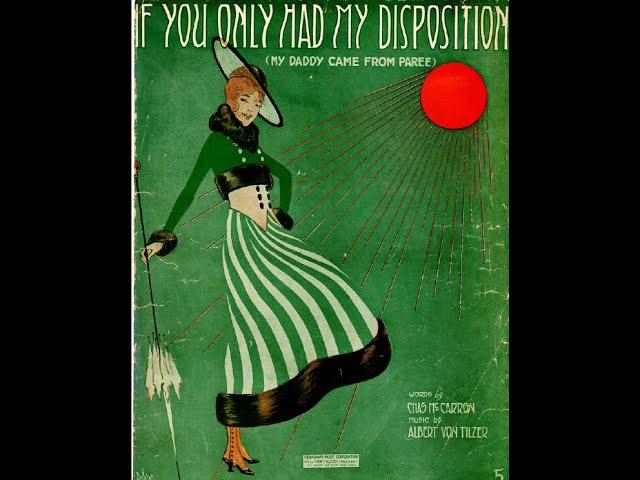
Peerless Quartet "If You Only Had My Disposition" Victor 17912 (1915) Arthur Collins Henry Burr
The Peerless Quartet sings "If You Only Had My Disposition" on Victor 17912, recorded on November 12, 1915.
The singers are Arthur Collins, John H. Meyer, Henry Burr, and Albert Campbell.
Words are by Chas. McCarron. Music is by Albert Von Tilzer. The song was published by Broadway Music Corporation in 1915.
The Peerless Quartet was the most successful vocal group of the acoustic era.
It was managed by bass singer Frank C. Stanley until his death from pneumonia at age 41 in December 1910. Afterwards it was led by tenor Henry Burr, who disbanded the quartet in 1929.
The Peerless basically evolved from the older Columbia Quartet, of which Stanley had been a member, though one could argue it evolved from the Invincible Quartet, which was one of several vocal groups that Stanley organized and managed.
The Columbia Quartet, usually credited only as "quartet" on the rim of cylinders and labels of discs, was formed in the late 1890s and underwent many personnel changes though Albert Campbell remained as first tenor.
By 1903 the Columbia Quartet consisted of Campbell, second tenor Henry Burr, a baritone (probably Arthur Collins on most records though Bob Roberts may be on some--Steve Porter was abroad at this time but may have been a Peerless member from around 1906 to 1908), and basso "Big Tom" Daniels.
Albert Campbell told Jim Walsh that Daniels sang in the quartet, maybe in 1902 and 1903. When Daniels was succeeded in late 1903 or early 1904 by Stanley, at least three of the original Peerless members were together.
The name Columbia Quartet is announced on very early Columbia discs but was not written on labels until around 1905. By 1907 the members adopted the name Peerless in order to work for other companies, naturally retaining the name Columbia Quartet for Columbia records.
Stanley did much of the lead singing upon joining. It was unusual for a bass-baritone to lead in quartet singing, which is normally led by the "second tenor" ("first" and "second" indicate the relative pitch of tenors, not their importance to a quartet--"first tenor" sings the highest).
In male quartet singing, the bass usually sings the foundation or root of a chord, the second tenor sings the melody, the first tenor sings harmony above the melody, and the baritone completes the chord by filling in the missing link somewhere between the bass and the first tenor.
The Invincible made Edison cylinders by 1902. The lineup for this was first tenor Byron G. Harlan; second tenor George Seymour Lenox; baritone Arthur Collins; and Stanley. On Columbia, American, and other disc releases, Campbell or Burr sang the lead in place of Lenox, who seems to have been exclusive to Edison. Managing the Invincible evidently gave Stanley the experience needed to manage the Peerless.
The Peerless made its Victor debut with "Women!" from Lehár's light opera The Merry Widow (single-sided 5392; later double-sided 16424).
Arthur Collins was an important Peerless member, singing lead on some numbers. With a voice well-suited for ragtime and other upbeat numbers, he contributed to the quartet's versatility.
The quartet was called the Columbia Quartet on Columbia records for years after other companies adopted the name Peerless. The Peerless name did not appear in a Columbia list until the release of "That Raggedy Rag" (A1177) in August 1912 (the Peerless also recorded it for Victor 17341). From that point on the quartet was usually called the Peerless on Columbia labels though the foursome was occasionally called the Columbia Quartet into the World War I period.
After Stanley's death in December 1910, Burr became manager and hired John Meyer, with whom Burr had been associated in church work, to sing bass parts.
This new combination was very popular. Campbell later recalled that there was so much studio work to be done, especially after Burr formed the Sterling Trio (which was the Peerless minus Collins), that the group had to go three shifts a day to meet recording commitments.
Around 1919 Collins departed the Peerless though as late as 1921 Columbia catalogs listed Collins as the quartet's baritone, or "first bass." Page 125 of the May 1919 issue of Talking Machine World identifies Collins as part of the "record makers on tour" throughout Ohio and Pennsylvania in May, though possibly Collins left months earlier and the trade journal was not informed. Columbia records made in 1917 feature Frank Croxton as bass and Meyer as baritone, which suggests Collins did not work regularly with the Peerless as late as 1919.
Campbell told Walsh, "It was a personal matter. He just couldn't get along with Burr."
Collins' departure created an opening for Croxton, who took over bass parts; Meyer, who had been singing bass, took baritone parts. This lineup remained until 1925.
Peerless Quartet "If You Only Had My Disposition" Victor 17912 (1915) Arthur Collins Henry Burr
The singers are Arthur Collins, John H. Meyer, Henry Burr, and Albert Campbell.
Words are by Chas. McCarron. Music is by Albert Von Tilzer. The song was published by Broadway Music Corporation in 1915.
The Peerless Quartet was the most successful vocal group of the acoustic era.
It was managed by bass singer Frank C. Stanley until his death from pneumonia at age 41 in December 1910. Afterwards it was led by tenor Henry Burr, who disbanded the quartet in 1929.
The Peerless basically evolved from the older Columbia Quartet, of which Stanley had been a member, though one could argue it evolved from the Invincible Quartet, which was one of several vocal groups that Stanley organized and managed.
The Columbia Quartet, usually credited only as "quartet" on the rim of cylinders and labels of discs, was formed in the late 1890s and underwent many personnel changes though Albert Campbell remained as first tenor.
By 1903 the Columbia Quartet consisted of Campbell, second tenor Henry Burr, a baritone (probably Arthur Collins on most records though Bob Roberts may be on some--Steve Porter was abroad at this time but may have been a Peerless member from around 1906 to 1908), and basso "Big Tom" Daniels.
Albert Campbell told Jim Walsh that Daniels sang in the quartet, maybe in 1902 and 1903. When Daniels was succeeded in late 1903 or early 1904 by Stanley, at least three of the original Peerless members were together.
The name Columbia Quartet is announced on very early Columbia discs but was not written on labels until around 1905. By 1907 the members adopted the name Peerless in order to work for other companies, naturally retaining the name Columbia Quartet for Columbia records.
Stanley did much of the lead singing upon joining. It was unusual for a bass-baritone to lead in quartet singing, which is normally led by the "second tenor" ("first" and "second" indicate the relative pitch of tenors, not their importance to a quartet--"first tenor" sings the highest).
In male quartet singing, the bass usually sings the foundation or root of a chord, the second tenor sings the melody, the first tenor sings harmony above the melody, and the baritone completes the chord by filling in the missing link somewhere between the bass and the first tenor.
The Invincible made Edison cylinders by 1902. The lineup for this was first tenor Byron G. Harlan; second tenor George Seymour Lenox; baritone Arthur Collins; and Stanley. On Columbia, American, and other disc releases, Campbell or Burr sang the lead in place of Lenox, who seems to have been exclusive to Edison. Managing the Invincible evidently gave Stanley the experience needed to manage the Peerless.
The Peerless made its Victor debut with "Women!" from Lehár's light opera The Merry Widow (single-sided 5392; later double-sided 16424).
Arthur Collins was an important Peerless member, singing lead on some numbers. With a voice well-suited for ragtime and other upbeat numbers, he contributed to the quartet's versatility.
The quartet was called the Columbia Quartet on Columbia records for years after other companies adopted the name Peerless. The Peerless name did not appear in a Columbia list until the release of "That Raggedy Rag" (A1177) in August 1912 (the Peerless also recorded it for Victor 17341). From that point on the quartet was usually called the Peerless on Columbia labels though the foursome was occasionally called the Columbia Quartet into the World War I period.
After Stanley's death in December 1910, Burr became manager and hired John Meyer, with whom Burr had been associated in church work, to sing bass parts.
This new combination was very popular. Campbell later recalled that there was so much studio work to be done, especially after Burr formed the Sterling Trio (which was the Peerless minus Collins), that the group had to go three shifts a day to meet recording commitments.
Around 1919 Collins departed the Peerless though as late as 1921 Columbia catalogs listed Collins as the quartet's baritone, or "first bass." Page 125 of the May 1919 issue of Talking Machine World identifies Collins as part of the "record makers on tour" throughout Ohio and Pennsylvania in May, though possibly Collins left months earlier and the trade journal was not informed. Columbia records made in 1917 feature Frank Croxton as bass and Meyer as baritone, which suggests Collins did not work regularly with the Peerless as late as 1919.
Campbell told Walsh, "It was a personal matter. He just couldn't get along with Burr."
Collins' departure created an opening for Croxton, who took over bass parts; Meyer, who had been singing bass, took baritone parts. This lineup remained until 1925.
Peerless Quartet "If You Only Had My Disposition" Victor 17912 (1915) Arthur Collins Henry Burr
Комментарии:
What is Workday HCM | ZaranTech
Workday Learner Community
Reacting to Rapping Flat Earther While Drinking
Professor Dave Explains
Phone Escape: Hopeless
Enigmaticon
This ain’t your average Taurus! SHO #shorts #cars
Josh Murray Reactions
Husaainabad ice Cream Street Food network ....
Street Food Network pk
Amazing Classic Fiberglass Boat Collections | PowerBoat Television
PowerBoat Television
The Definitive Zürcher Rahmgeschnetzeltes Recipe Revealed!
Flo's German Kitchen


























